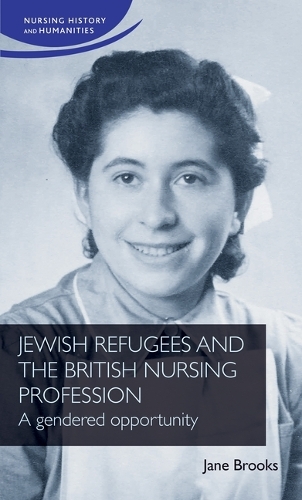
Jewish Refugees and the British Nursing Profession: A Gendered Opportunity
(Paperback)
Available Formats
Publishing Details
Jewish Refugees and the British Nursing Profession: A Gendered Opportunity
By (Author) Jane Brooks
Manchester University Press
Manchester University Press
29th April 2026
United Kingdom
Classifications
Tertiary Education
Non Fiction
Oral history
Social and cultural history
610.730941
Physical Properties
Paperback
288
Width 138mm, Height 216mm
Description
This book follows the lives of female Jewish refugees who fled Nazi persecution and became nurses. Nursing was nominally a profession but with its poor pay and harsh discipline, it was unpopular with British women. In the years preceding the Second World War, hospitals in Britain suffered chronic nurse staffing crises. As the country faced inevitable war, the Government and the profession's elite courted refugees as an antidote to the shortages, but many hospitals refused to employ Continental Jews.
The book explores the changes in the refugees' status and lives from the war years to the foundation of the National Health Service and to the latter decades of the twentieth century. It places the refugees at the forefront of manoeuvres in nursing practice, education and research at a time of social upheaval and alterations in the position of women.
Reviews
Winner of the 2024 Lavinia L. Dock Book Prize 2024.
'Jewish refugees and the British nursing profession is a highly insightful book, very much to be recommended to all: historians, nurses, doctors, and, indeed, politicians.'
Leo van Bergen, Medicine, Conflict and Survival Journal
Brooks tells the compelling tale of the nursing program for Jewish girls that was a lifeline out of Nazi Germany and a gift to the British nursing profession. Fascinating and shameful story of exploitation, survival, and the creation of a special group of nurse leaders for Britain. A must read!
Sioban Nelson, University of Toronto
Jewish Refugees and the British Nursing Profession contributes a new chapter to the story of the Jews in Britain. This is an important aspect of British Jewish history that has simply not been noticed before. The work is meticulously documented, using original oral and written testimony, which is analysed with sophistication and skill, and presented in a highly readable style.
Philip Alexander, University of Manchester
Brooks presents a rich history of this particularly underrepresented group in a well organized, meaningful, and contextualized manner. She weaves a compelling narrative that builds on the refugees stories illustrating how they dealt with loneliness, loss of family and country, contention with being seen as alien enemies and then as accepted professionals (albeit in a gendered role), and their resilience to survive.
Sandra B. Lewenson, Nursing History Review
Author Bio
Jane Brooks is a Senior Lecturer in the School of Health Sciences at the University of Manchester
